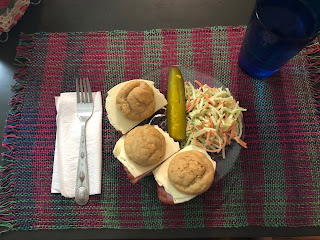Never fear -- I am not going to turn this into a diet blog, or a dieting blog, or a lifestyle change blog, or any permutation thereof. I don't pretend to be an expert on anything except myself. And I'm not trying to become an influencer, nor am I looking for sponsors.
I also didn't mean to start this post with a disclaimer, but there you have it.
I just wanted to let y'all know about a thing I've been doing for almost a year now. It's a low-carb diet, kinda sorta, and I kinda sorta came up with it myself -- which is to say it's not keto or Atkins or carb counting or any of those.
If it's anything, it's based on an out-of-print book called The 30-Day Diabetes Cure. The link is to Amazon but don't buy it from them (how often do you hear me say that?) because they're charging a ridiculous amount for it; try Better World Books instead.
Some background: I've had type 2 diabetes for about ten years now. For a long time I was in denial -- mainly because the first thing any doctor will say to you, when you turn up in their office as diabetic or pre-diabetic, is to lose weight. But I'd been dieting since I was eleven years old and had lost hundreds of pounds, only to see them all come back -- and bring friends. At last, I concluded that diets don't work, and that in fact they only serve to line the pockets of the diet and fitness industry. But doctors don't want to hear that. If you tell a doctor that you're not going to go on a diet, they label you as uncooperative -- or worse.
I tried to cooperate -- a little. I went to see a dietitian, who tried to sell me meal-replacement shakes "to jump-start your weight loss." That's a diet, honey, so nope. Later, I saw another dietitian, who tried to get me to track what I was eating and how much and all that stuff. "Does that feel like a diet?" she asked me. Hell, yes, it does, and it's exactly what I swore I'd never do again. She eventually passed me off to another dietitian, who seemed enthusiastic when I mentioned low-carbing (I'd read online that it could work for diabetics - here's a recent study), but of course she wanted me to track my carbs and -- all together now -- THAT'S A DIET.
What I needed was for somebody to tell me which types of foods to stay away from. But nobody wants to do that, and I have a feeling it's because they're in cahoots with the food manufacturers and Big Pharma -- industries that would rather sell you highly processed foods, fake sweeteners, and expensive drugs so new that there are no generics for them. But that's a whole 'nother blog post or three.
Anyway, this book: A clerk in a vitamin-supplement store here in Santa Fe recommended it to me. "Diabetes is all about what you eat," she said. And I thought, if this book will tell me what to eat to bring my blood sugar down, I'm in. So I ordered a copy and read it. Then, a year ago this week, I started doing it.
For the first ten days, you get no sugar, no alcohol, and no carbs. Most veggies are okay, but no fruits. That's supposed to bring your blood sugar down to normal. Mine was pretty high at the time, even with the super-expensive drugs I was on, so I didn't get to normal in ten days -- but my readings did drop a significant amount. So I kept doing it.
It's been a year, as I said. I've been off the super-expensive drugs for months. My blood sugar is still not quite normal, but it's close. I've lost about 25 pounds and have kept it off, which is huge for me; if I were concentrating on losing weight, I would have given up in frustration months ago.
Here's a funny thing: I'm not interested in sweets or high-carb foods. I suspect it's because I'm not eating them, so there's no craving to trigger. In fact, I can taste hidden sugars in restaurant foods now -- and I don't like them.
That doesn't mean I'm eating bland meals. Here's my dinner tonight: ham and provolone with brown mustard on almond-flour rolls, broccoli slaw, and a dill pickle spear.
 |
| Lynne Cantwell 2022 |
I'm not saying this will work for everybody. But it makes sense that if eating carbs raises your blood sugar, not eating them will lower it. And I've never had a doctor, or a diabetes educator, or a dietitian flat-out tell me that. I had to find out on my own.
So now I've told you.
***
These moments of non-dieting blogginess have been brought to you, as a public service, by Lynne Cantwell. Get vaxxed! Wear a mask!

2 comments:
Not a dieter, never been good at self-deprivation or discipline but I love good healthy recipe ideas. Thanks for sharing ♥️
You're welcome!
In another blog post (the link is in this article), I talked about a WWII-era study that was supposed to find out how best to help starving refugees recover. The test subjects had to be starved first, of course. Guess how many calories they were allowed? 1,600 calories per day. That was considered to be semi-starvation rations then, but it's *less* than the 1,200 to 1,500 calories per day that doctors recommend for dieters now. And the test subjects exhibited all sorts of mental and physical side effects: sexual dysfunction, anxiety, depression, body dysmorphia. Just like chronic dieters do now. Our diet culture is insane.
Post a Comment